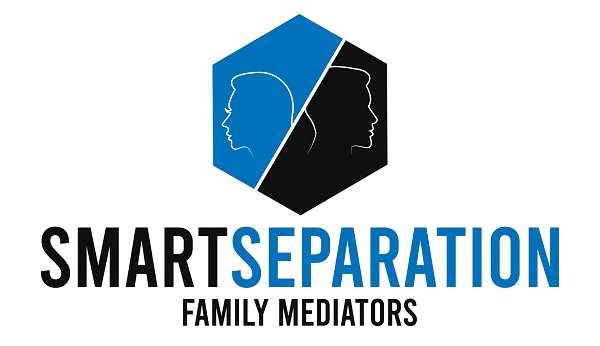What Is Family Mediation?
Family mediation in Ontario is a voluntary and confidential process designed to help separating or divorcing couples resolve their differences without going to court. Under the Ontario Family Law Act, mediation provides an opportunity for both parties to communicate openly and reach mutually beneficial agreements about parenting, property division, and financial support.
Unlike a judge or lawyer, a family mediator is a neutral third party. Their role isn’t to make decisions or take sides — instead, they guide productive discussions, help clarify priorities, and encourage fair, practical outcomes.
The primary goals of family mediation include fostering cooperation, protecting confidentiality, and promoting long-term stability for everyone involved, especially children. By focusing on understanding rather than blame, mediation allows families to maintain control over their future while avoiding the stress and expense of litigation.
At Smart Separation, our accredited Ontario family mediators are trained to balance empathy with legal insight. We create a supportive environment where clients feel heard, respected, and empowered to make informed decisions that work for their unique circumstances. Through our client-centred approach, we help families find common ground and move forward with clarity and confidence.
Benefits of Family Mediation vs. Court
Family mediation offers a more balanced and constructive alternative to traditional court proceedings in Ontario. Instead of adversarial battles and lengthy delays, mediation provides couples with a structured, respectful environment to reach agreements that work for both parties.
Faster Resolutions:
Most mediation cases in Ontario are completed within a few weeks, compared to the months—or even years—it can take for court cases to conclude. This allows families to move forward sooner with less emotional strain.
Lower Cost:
Mediation is typically much more affordable than litigation. With fixed-fee and predictable pricing, couples avoid the unpredictable hourly legal fees that come with court proceedings.
Confidential:
Unlike public court hearings, mediation sessions are private and confidential, ensuring that sensitive family and financial matters remain protected.
Child-Focused Outcomes:
Mediation encourages parents to work together in the best interests of their children. The process supports healthy co-parenting relationships and helps minimize the emotional impact of separation on kids.
Empowerment:
Through mediation, couples maintain control over their own decisions rather than leaving life-changing outcomes—such as custody, property, or support—to a judge. This sense of empowerment often leads to more lasting and cooperative agreements.
Issues Family Mediation Can Resolve
Parenting Plans, Custody, and Access Arrangements:
Mediation helps parents develop child-focused parenting schedules and decision-making plans that prioritize the well-being and stability of their children.
Child Support and Spousal Support:
Mediators assist in determining fair support amounts that align with Ontario’s Child Support Guidelines and reflect each family’s financial circumstances.
Division of Property, Assets, and Debts:
Couples can negotiate how to divide their shared assets, savings, and debts in a transparent and balanced way.
Matrimonial Home and Pension Division:
Mediation allows spouses to discuss complex issues like who remains in the matrimonial home or how pensions and retirement savings are shared.
Common-Law Separation Issues:
For unmarried couples, mediation provides a way to resolve property and financial disputes under Ontario’s laws governing common-law relationships.
Post-Separation or Post-Divorce Modifications:
Mediation can also be used to adjust existing agreements when life circumstances change — such as new jobs, moves, or changes in children’s needs.
The Family Mediation Process at Smart Separation
- Free Initial Consultation – We begin with a complimentary consultation to explain the mediation process, answer questions, and determine whether mediation is the right option for your situation.
- Agreement to Mediate – Before sessions begin, both parties sign an Agreement to Mediate that outlines confidentiality, voluntary participation, and the mediator’s neutral role.
- Information Gathering – Each party provides relevant details such as income, assets, debts, and family background. Full financial disclosure ensures informed and balanced discussions.
- Mediation Sessions – Mediation meetings are held in person or online, depending on client preference. The mediator facilitates calm, constructive discussions to help both parties identify issues, explore options, and find common ground.
- Drafting the Agreement – Once terms are reached, the mediator prepares a written summary or draft Separation Agreement outlining all settled matters clearly and concisely.
- Independent Legal Advice – Before signing, both parties are encouraged to seek independent legal advice from family lawyers to confirm that the agreement is fair and legally sound.
- Finalization & Filing – After both parties sign, the agreement can be filed with the court (if needed) to make it legally binding and enforceable under Ontario law.
Who Should Consider Family Mediation?
Couples Who Want to Avoid Court:
If you prefer a calm, solution-focused approach rather than an adversarial court process, mediation provides a practical alternative that encourages cooperation and mutual understanding.
Parents Prioritizing Children’s Wellbeing:
Mediation is especially beneficial for parents who want to create parenting plans that promote stability and emotional security for their children, while reducing conflict and protecting family relationships.
Partners Who Want to Preserve Respectful Communication:
For couples seeking to part ways amicably, mediation fosters healthy communication and respect—both essential for long-term co-parenting and post-separation peace.
Common-Law or Married Couples Needing Guidance After Separation:
Whether legally married or in a common-law relationship, mediation helps partners reach fair resolutions on issues like property division, support, and parenting without costly litigation.
Excluded Cases:
Mediation is not recommended in situations involving abuse, coercion, intimidation, or when one party is unwilling to participate in good faith. In such cases, alternative legal or protective measures should be considered to ensure safety and fairness.
Cost of Family Mediation in Ontario
Transparent Fixed-Fee Packages:
Unlike traditional legal billing that charges by the hour, Smart Separation provides clear, upfront pricing with no hidden costs. Our packages cover all essential steps of the mediation process — from intake and document review to the final written agreement — so clients know exactly what to expect.
Lower Than Court or Lawyer-Driven Divorce Costs:
The average lawyer-led divorce in Ontario can cost tens of thousands of dollars, depending on complexity and courtroom time. In contrast, family mediation typically costs a fraction of that amount, helping couples save both money and emotional energy.
Affordable, Predictable, and Time-Saving:
Because mediation sessions are solution-focused, most cases are resolved in just a few meetings. This efficiency not only reduces cost but also helps families move forward more quickly compared to drawn-out litigation.
Subsidies and Tax Considerations:
Some Ontario families may qualify for government-subsidized mediation through community-based services, and in certain cases, legal or mediation fees may be tax-deductible if related to spousal or child support determinations.
Is a Mediation Agreement Legally Binding?
How Mediated Agreements Become Binding Under Ontario Law:
When both parties reach a consensus during mediation, the mediator drafts a written Memorandum of Understanding (MOU) or Separation Agreement that reflects the terms discussed. Once this document is reviewed, signed, and witnessed, it becomes a legally enforceable contract under the Ontario Family Law Act.
Steps to File and Convert Agreements into Court Orders:
In some cases, couples choose to file their signed agreement with the Ontario Court of Justice or the Superior Court of Justice (Family Division). Once filed, the agreement can be converted into a court order, giving it the same enforceability as a judgment. This is especially useful for parenting or support arrangements.
Importance of Independent Legal Review before Signing:
Before signing, both parties are strongly encouraged to obtain independent legal advice. A family lawyer reviews the agreement to confirm that each party understands the terms, the implications, and their legal rights. This step ensures fairness and helps prevent disputes later on.
Role of the Mediator vs. Role of the Lawyer:
A mediator facilitates discussions and helps both parties reach mutual understanding, but they do not provide legal advice or advocate for either side. In contrast, a lawyer advises clients on their rights and obligations, reviews the final document, and ensures it complies with Ontario law.
How Mediation Supports Children and Families
Emotional Benefits for Children When Parents Cooperate:
When parents work together instead of against each other, children experience less anxiety, confusion, and emotional strain. Seeing their parents communicate respectfully reassures them that both will remain active, supportive figures in their lives.
How Mediators Help Parents Develop Effective Parenting Plans:
Trained family mediators guide parents through the process of creating child-focused parenting plans. These plans outline clear schedules, decision-making responsibilities, and communication strategies, helping parents anticipate challenges and avoid future disputes.
Minimizing Stress and Ensuring Consistency for Kids:
Mediation emphasizes stability — maintaining familiar routines, schools, and community connections whenever possible. By reducing conflict and uncertainty, mediation allows children to adjust more smoothly to new family dynamics and thrive emotionally and academically.
Why Choose Smart Separation?
Accredited Family Mediators with Expertise in Ontario Family Law:
Our family mediators are fully accredited and experienced in Ontario’s Family Law Act, ensuring that every agreement aligns with provincial legal standards while remaining practical and fair for both parties.
Convenient Office Locations and Virtual Mediation Options:
We proudly serve families across Ontario with offices in Toronto, Vaughan, and Mississauga, as well as secure virtual mediation sessions for clients anywhere in the province.
Fixed-Fee Transparency and Child-Focused Approach:
Smart Separation’s fixed-fee model offers predictable pricing without hidden costs, making high-quality mediation accessible to all families. Our mediators keep children’s best interests at the centre of every discussion, fostering cooperation and emotional wellbeing.
Commitment to Empathy, Neutrality, and Long-Term Resolution:
We believe that separation doesn’t have to create lifelong tension. Our mediators maintain complete neutrality and guide couples toward balanced, respectful outcomes that support lasting peace and family harmony.
Frequently Asked Questions
Do I need a lawyer if I have a mediator?
While mediators help both parties reach an agreement, they do not provide legal advice. It’s recommended that each party consults a family lawyer for independent legal advice before signing the final agreement to ensure it’s fair and legally sound.
How long does family mediation take?
The timeline varies depending on the complexity of the issues and the willingness of both parties to cooperate. Many Ontario couples reach resolution within three to five sessions, often concluding within weeks instead of months.
What happens if mediation fails?
If mediation does not result in a full agreement, the parties can still use the progress made to narrow down remaining issues before proceeding to arbitration or court. Mediators may also refer clients to other dispute resolution options if needed.
Can mediation work for high-conflict couples?
Yes, as long as both parties are willing to participate respectfully. Experienced mediators are trained to manage tension, keep discussions focused, and ensure a safe and balanced environment for negotiation.
What documents should I bring to my first session?
It’s helpful to bring financial statements, income documents (such as tax returns or pay stubs), mortgage or debt information, and any existing parenting or legal agreements. Full disclosure helps create a fair, transparent foundation for the mediation process.
Get Started with Smart Separation
Take the first step toward a calmer, more cooperative resolution with Smart Separation. Our experienced mediators are here to guide you through every stage of the process — from your first conversation to a finalized agreement that works for your family’s future.
We invite you to schedule a Free 15-Minute Consultation to learn how mediation can help you resolve your family matters efficiently, privately, and affordably.
👉 Book Your Mediation Session
As an experienced family and divorce mediator in Toronto, I often write blogs to provide insights, tips, and resources on family mediation and divorce in Ontario. Follow my blog to stay informed and empowered during challenging times.



